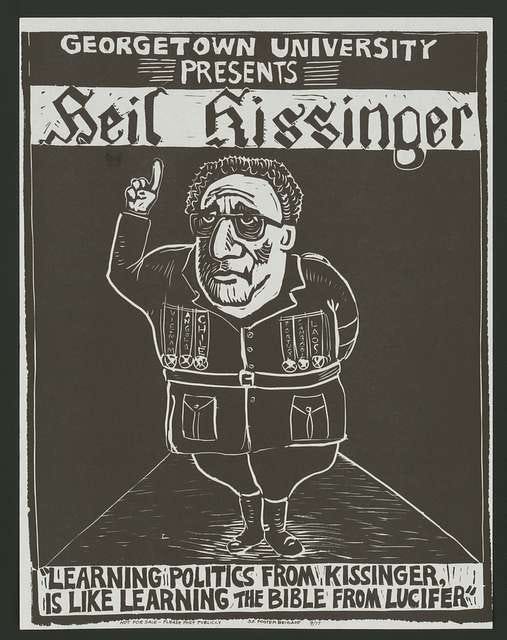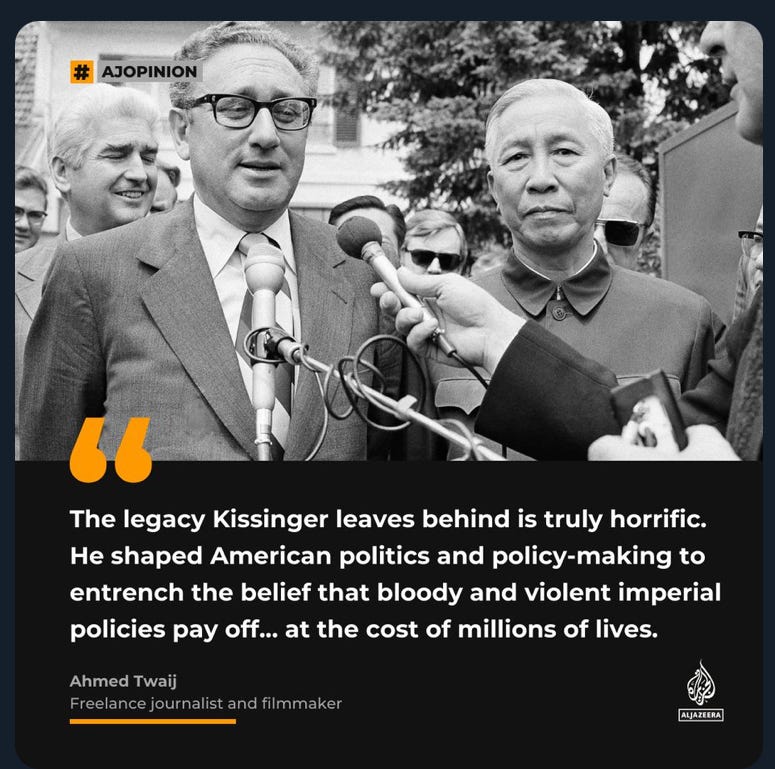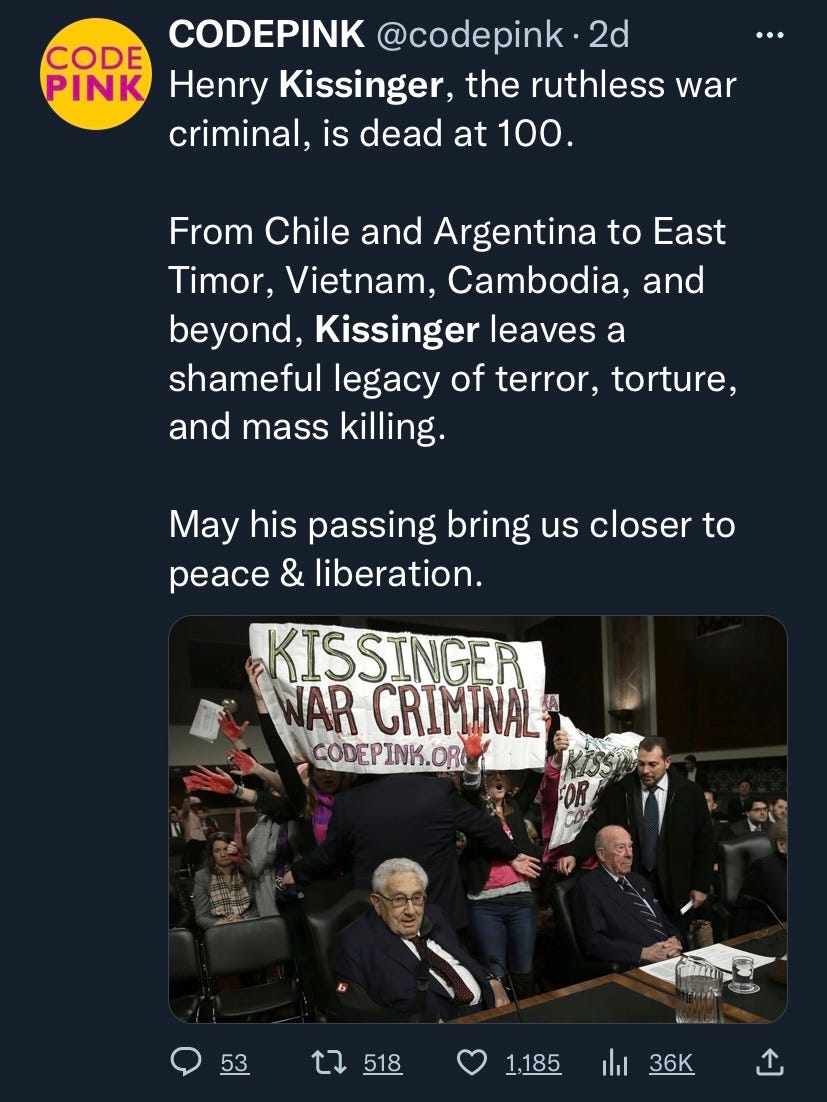This Wednesday, war criminal Henry Kissinger finally died. Having rained death and destruction around the planet for decades, claimed powers far beyond his constitutional role, and escaped accountability for international human rights abuses from Laos to Chile, he died in relative peace at the ripe age of 100—proving the unfortunate reality that there is little justice to be found in this world.
But one might maintain some hope for justice beyond it.
A trail of corpses
Kisisnger’s primary legacy is the preventable death of millions, from southeast Asia to Latin America, who were driven to early graves by his decisions aiming to assert American hegemony over the globe.
Yale historian Greg Gandlin wrote Kissinger’s Shadow, a powerful examination of the man’s long trail of crimes against humanity. Gandlin wrote that 3-4 million people died due to Kissinger’s machinations, which extended the Vietnam war both beyond when it could have otherwise ended, and also beyond the borders of Vietnam into neighboring countries subjected to horrifying civilian casualties in order to serve Kissinger’s crass objectives.
America’s vicious bombing of Laos and Cambodia were among the most gruesome and heinous crimes in human history. It continues to haunt the region to this day: almost one-third of Laos remains contaminated with unexploded ordnance. According to Cambodian American political scientist Sophal Ear, “To this day, there are people who…lose limb and life in the process of trying to make a living in a land that has been filled with bombs.”
Over the course of the decade-long American campaign to bomb neutral countries adjacent to the one in which it waged an overt war of colonial occupation, Washington dropped more bombs on Cambodia and Laos than it deployed during the entirety of the Second World War. Laos tragically became the most bombed country in human history, even though it was not at war with anyone.
Cambodia and Laos were both neutral countries, which is to say the American bombing campaigns were overt violations of international law, acts of international aggression that should have revealed to the world the nature of Washington’s work in the world.
It’s no wonder that Kissinger and his henchmen in Washington worked so hard to suppress the truth, and their role in the mass murder of millions. It was Kissinger who demonized renowned military whistleblower Daniel Ellsberg, who Nixon described before his eventual resignation as “the most dangerous man in America.”
The late Anthony Bourdain may have most fairly described this phase of Kissinger’s career:
"Once you’ve been to Cambodia, you’ll never stop wanting to beat Henry Kissinger to death with your bare hands. You will never again be able to open a newspaper and read about that treacherous, prevaricating, murderous scumbag sitting down for a nice chat with Charlie Rose or attending some black-tie affair for a new glossy magazine without choking. Witness what Henry did in Cambodia – the fruits of his genius for statesmanship – and you will never understand why he’s not sitting in the dock at The Hague next to Milošević."
But Cambodia & Laos weren’t the only places where Kissinger helped engineer the genocidal slaughter of civilians by the millions.
He did the same thing in my native country.
Yet another genocide
In 1971, the military dictator in the country from which my parents had migrated—Pakistan—launched a genocidal massacre lasting nearly a year in what is now Bangladesh.
Pakistani President (and former Army Chief) Yahya Khan had imposed martial law in Pakistan two years before launching his genocidal Operation Searchlight. It killed between half a million and three million Bengalis, and forcibly displaced another eight million. It remains one of the world’s most overlooked campaigns of genocide.
This mass murder and mayhem was a campaign of state violence orchestrated to contain the movement for self-determination among Bengalis that had been growing for years, and ultimately proved successful a year after Islamabad’s invasion. Its goal was both simple and criminal: denying self-determination and imposing foreign rule on a civilian population that rejected it.
Khan was enabled by the Pakistani military, which owns a vastly disproportionate share of the country’s resources and has established a decades-long habit of intervening to interrupt democracy at more or less the drop of a hat. Pakistani generals notoriously based their military industrial complex on that of the United States, and insulated themselves from accountability for their roles in human rights abuses and crimes against democracy.
But Khan—like so many other murderous despots around the world—was backed by Washington.
Kissinger’s principal interest in Pakistan was courting China, with whom Islamabad had established close ties. Nixon, following Kissinger’s guidance, looked the other way as the Pakistani military massacred millions of Bengalis.
Very little has changed in the time since then.
American interference with Pakistani politics remains prolific and undeterred to this day. Earlier this year, Washington helped removed a democratically elected leader who rejected Washington’s proxy war in Ukraine, and then lied about it before getting caught by investigative journalists. Ironically, that former Prime Minister, Imran Khan, shares the same last name as his predecessor whose genocide Washington instead chose to indulge due to Kissinger’s substantial influence.
The only difference between Kissinger’s support for genocide around the world over the past half century and Biden’s complicity with Netanyahu’s genocidal campaign targeting Gaza today is the scale of the destruction.
Can one fairly discern progress from today’s genocides growing smaller than those of a previous era?
The legacy of September 11
Most Americans recall September 11 as the date of the attacks in 2001 that felled the Twin Towers in New York City. Long before that day, and the murderous legacy of American imperialism responding to it, September 11 had been memorialized around the world as an anniversary commemorating American belligerence and the CIA’s work undermining democracy in the service of Wall Street.
On that day in 1973 (just two years after the massacre in Bangladesh, and while the Vietnam war continued to escalate), Kissinger directed the CIA to stage a coup in Chile. At the time, a recently democratically elected leader, President Salvador Allende, had promised to nationalize copper reserves on which Wall Street relied.
Like many other acts of American imperialism, the CIA’s coup both directly and indirectly undermined environmental sustainability, casting worldwide harms indefinitely into the future to serve the aspirations of a handful of corrupt officials in Washington.
But Kissinger’s attacks on democracy were not confined to foreign shores.
Three years after the coup in Santiago, a car bomb exploded in Washington, killing a Chilean diplomat and his American co-worker. Evidence implicated the regime of Augusto Pinchoet, who Kissinger had installed after the CIA’s 1973 coup in order to ensure Wall Street’s continued access to the country’s copper exports. Before the bombing, Kissinger reviewed intelligence reports that Pinochet’s government was hatching assassination plots targeting his international critics, but Kissinger directed the CIA not to pursue the intelligence any further, effectively inviting the lethal result.
The later history indicates how Kissinger’s depravity institutionally influenced Washington long after he left office. Writing powerfully in Rolling Stone, Spencer Ackerman explained that:
In 1999, Pinochet was arrested in London through an effort by Baltazar Garzon, a Spanish judge investigating Operation Condor. Kissinger urged the British not to extradite the general. “I would be very happy if Pinochet was allowed home,” he told an interviewer. “This episode has gone on long enough and all my sympathies are with him.” Two years later, the administration of George W. Bush responded contemptuously to the Chilean Supreme Court’s efforts to compel Kissinger to testify. “It is unjust and ridiculous that a distinguished servant of this country should be harassed by foreign courts in this way,” an official told the Daily Telegraph. The paper noted that Kissinger was an “informal adviser” to Bush, as he was to many presidents.
Bush’s declaration of protection for Kissinger, coupled with his rejection of the Rome Treaty on the International Criminal Court, extinguished a glimmer of hope that Kissinger would someday join Pinochet under arrest. It was always a fantasy. The international architecture that the U.S. and its allies established after World War II, shorthanded today as the “rules-based international order,” somehow never gets around to applying the same pressure on a hegemonic United States as it applies to U.S.-hostile or defiant powers. It reflects the organizing principle of American exceptionalism: America acts; it is not acted upon. Henry Kissinger was a supreme architect of the rules-based international order.
Subverting democracy in Washington
Rather than confine his influence to foreign policy, Kissinger also committed domestic constitutional crimes for which he was never held responsible.
His role extending the Vietnam War offers the most glaring example. Working with the Nixon campaign (which he had opposed until after Nixon won the 1968 Republican primary), Kissinger infamously used his ties to a diplomatic delegation negotiating peace talks with Vietnam to subvert the talks. Kissinger was concerned that if President Johnson were able to secure peace in Vietnam, it would swing the election to Democrats.
But Kissinger’s orchestration of foreign policy directly undermining the Johnson White House was a constitutional crime akin to treason.
Kissinger also displayed a remarkable willingness to gaslight the public. He lied to Congress about bombing Cambodia, and the lies didn’t stop there.
Kissinger lied in public not only about the arenas in which he enabled one genocide after another, but also his own legacy and values. Observing the Arab Spring in 2011, he had the audacity to publicly write in the Washington Post:
Like most Americans, we believe that the United States should always support democracy and human rights politically, economically and diplomatically, just as we championed freedom for the captive peoples of the Soviet empire during the Cold War. Our values impel us to alleviate human suffering.
If his genocidal machinations, lies in public to cover them up, and lifelong unaccountability were not bad enough, Kissinger also overtly disrespected U.S. service members, many of them are compelled by what amounts to a “poverty draft” to risk their lives to serve American imperialism. His reprehensible comments included this gem: “Military men are just dumb, stupid animals to be used as pawns in foreign policy.”
It is one thing to murder millions, lie about it and one’s own values, and to live out a long life in impunity. Insulting the people on whose backs (and graves) he built his legacy reveals just how disgusting, depraved, and deplorable Henry Kissinger was.
Humanity could breathe a sigh of relief at his death, had Kissinger’s life not done so much to ensure death, destruction, and the decline of democracies around the world.
Paid subscribers can gain access to a collection of comedy sketches and memes that addressed Kissinger’s legacy more thoughtfully than most American corporate news outlets. The man’s left a hateful and revolting legacy, and since justice for his crimes remained lacking during his life, he deserves relentless ridicule in death.
Keep reading with a 7-day free trial
Subscribe to Chronicles of a Dying Empire to keep reading this post and get 7 days of free access to the full post archives.






